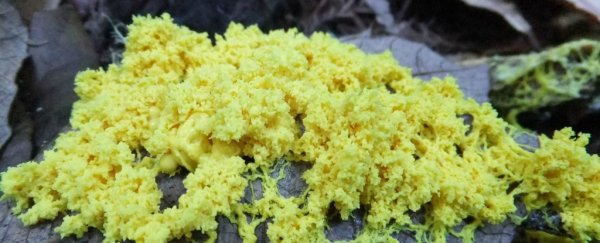While intelligence can be an extremely complex thing to define, we can all agree that a prerequisite for being clever is having a brain - preferably with a nervous system attached. But what about single-celled organisms? Can they be intelligent?
Well, if you believe that intelligence stems from the brain, like most researchers do, then the answer is no, but a new study hints that there's more to this story than we think, because a brainless slime organism has shown signs of learning.
While we're nowhere near a situation like in 1988's The Blob, with sentient goo causing unmitigated chaos, researchers from Toulouse University in France have witnessed 'habituation learning' in a brainless slime.
This means that the slime, over time, learned to avoid certain stimuli the same way that more complex creatures do. For example, if you touch a hot stove, you'll never make that mistake again, because you know it'll burn you.
To study this, the team used Physarum polycephalum, also called the many-headed slime, which is commonly found on decaying leaves in damp areas. Though each individual is made up of a single cell, they grow together to form a yellow puddle of slime.
The slime was placed on a petri dish connected via a small bridge to another petri dish full of delicious oats for the slime to eat. On the bridge, the researchers left patches of concentrated caffeine that taste bitter and unpleasant to the slime.
At first, the slime disliked the caffeine-laced areas on the bridge and tried to avoid them, which was expected, because all living things will generally avoid sources of unpleasantness. The crazy part is that, after a few days, the slime got better and better at navigating the 'safe' areas of the bridge, showing that it learned from past expeditions and, therefore, held some form of basic intelligence.
Evolutionarily speaking, this means that intelligence could have formed long before the body parts we typically associate with it, though the form of intelligence displayed by the slime is vastly different from how we typically think of it - for example, in terms of higher consciousness, problem-solving, and forward-thinking. It will likely take a lot more research to understand where habituation learning stems from.
Besides offering a unique look into how intelligence might have formed, the team hopes their study will also help us better understand the inner workings of the viruses and bacteria that might seem very simple on the surface, but which wield an incredible amount of influence on the human existence.
The team's study was published in the journal Proceedings of the Royal Society B.
